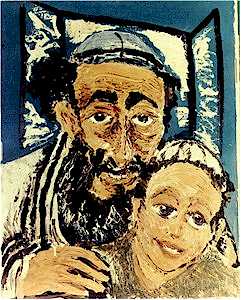On Giving Rebuke:
A Guide to the Hypercritical and
Hypersensitive
What were your feelings the last time you were rebuked? When someone felt
that you needed a strong dose of corrective medicine, that you should be straightened out
for your own good, that you should be publicly (or privately) upbraided on something that
you did?
I bet you were upset. Really upset. Especially if you are a sensitive soul
like me. Maybe you found yourself muttering silently to yourself for days. "Hey, he's
is a fine one to talk," "I hope someone treats him to a taste of his medicine in
public sometime," "G-d knows I'm not perfect, but at least I try to improve;
why are you picking on me?" Or perhaps you just wanted to crawl under a rock, change
your name, or move to a town where no one knew you.
Rebukes are a very hard thing to receive. It really does not make a major
difference if the rebuke is valid or not. In fact, when there is not even a tiny bit of
truth to it, we can sometimes feel a little better, knowing that there is no basis to the
scolding. However, even so, if the arrows were well sharpened, or the words tipped with
the right "poison," or the bowman a respected figure, we will still feel the
sting of the attack.
 And what about rebuke that comes from a
"religious person"? Someone who says, that it is a Torah mitzvah to rebuke one's
fellow: "You shall surely rebuke your fellow man" [Kedoshim 19:17]. Someone who
points out that the prophets often rebuked the people for their own moral betterment, and
that he is only doing the same.
And what about rebuke that comes from a
"religious person"? Someone who says, that it is a Torah mitzvah to rebuke one's
fellow: "You shall surely rebuke your fellow man" [Kedoshim 19:17]. Someone who
points out that the prophets often rebuked the people for their own moral betterment, and
that he is only doing the same.
In fact, he informs you, there is a school of orthodox Jewish thinking
called Mussar - whose subscribers used intensive self-criticism and criticism to elevate
their character traits and those of their fellow Jews.
So you see, this criticism is really a good thing, and you will appreciate that you
were given this opportunity to rectify yourself. After all, would it really be better that
you remained blissfully unaware of the reproachful nature of your conduct? If you weren't
reprimanded now, you could have even gotten worse. So this rebuke is really a good thing
for your moral welfare.
Of course, there are refutations that we can bring to these arguments. But let's not
get into a direct battle with the rebukers. Maybe it's true that these rebukers have
overly acerbic and critical temperaments - but what's to be gained by rebuking the
rebukers? Besides, is there not a place and a time for criticizing people? When someone
behaves in an obnoxious manner, aren't we justified in giving them a scolding?
In order to better understand these issues, we first have to examine some basic Jewish
principles.
Basic Principles
Rabbi Akiva has stated "Love your neighbor as yourself, this is (a) great general
principle (klal) of Torah" [Rashi, Torath Kohanim on Kedoshim 19:18]. In Hebrew, the
term klal means a principle that is universal. Some concepts or principles apply in
particular situations and conditions. Certain laws apply to particular people or items or
at particular times. However, a klal is something that is universally applicable. Even
more so, it is a "foundational" principle.
What is a foundation? It is something that one builds a building upon. If there is a
flaw in the foundation, if it is cracked or weak, then there is a threat to the entire
superstructure upon which it is built.
This what a klal really is. It is the foundation on which everything else stands. One
cannot build a superstructure of mitzvoth, one cannot be an upright Torah observant Jew if
there is a flaw in the foundation. The entire structure of observance and mitzvoth can
tilt or topple if the foundation is flawed.
From this we can understand that without the love of one's fellow Jew (Ahavas Yisroel),
the entire edifice of one's Jewish observance is going to be wobbly.
Application
How does Ahavas Yisroel apply to the issue of rebuke?
Earlier we mentioned that there are those who claim their rebuke is based on the school
of Mussar. That it is a veritable "mitzvah" to strike fear and terror when
reprimanding someone for a misdeed - for this is what the rabbis and maggidim of the
Mussar school did, and so did the prophets.
The Rebbe points out in a talk (sicha) [Shemos, 19 Kislev 5751] that the great rabbis
of the Mussar movement of old never did anything of this sort (nor did the prophets or
maggidim). For they well understood the statement of King Shlomo in Proverbs [Mishley 1:8]
"Listen my son, to the Mussar of your father."
 This means that the rebuke that one gives must be as a father to a son. A
father's love for his son is something constant and unequivocal. Even at the moment when
he is criticizing him, the son knows that the father truly loves him. In fact, the father
loves the son even more than himself, as one can see with one's own eyes.
This means that the rebuke that one gives must be as a father to a son. A
father's love for his son is something constant and unequivocal. Even at the moment when
he is criticizing him, the son knows that the father truly loves him. In fact, the father
loves the son even more than himself, as one can see with one's own eyes.
Thus, while there certainly is a mitzvah of rebuke, one must know that this mitzvah
must have a foundation of Ahavas Yisroel. Simply stated, any criticism that has to be
given must be permeated with love.
How much love? To the extent that the listener himself feels and perceives the love
that is in the criticism. And if this is not the case, then the fault is in the giver of
the rebuke, and not in the receiver.
Moreover, The command "You shall rebuke" is preceded by the words "You
shall not hate your brother," for this is a precondition for the rebuke. The Torah
continues, "...and you shall not ascribe sin to him," for if the rebuke was
ineffectual, you are certainly the one responsible, for yours were not words coming from
the heart [Ha Yom Yom 26-Iyar].
From this last point we see that the touchstone for loving rebuke is that it is
effectual. And if is not effectual then it will rebound negatively on the giver.
A Good Eye
All that we have said above applies after one has determined that rebuke is actually
called for. Once we know that it is applicable, then we must deliver it with Ahavas
Yisroel. But first we really need to establish some guidelines on how to know when rebuke
is the correct response.
The rabbis frequently told us that we should view every Jew with a good eye [Avot 2:10,
2:1, 5:19]. Simply put, this means to look at everyone favorably, with a generous spirit.
The great Rabbi Hillel puts this principle as follows: "Don't judge someone until
you are in his place" [Avot 2:4]. The Bartenura explains this to mean that if you see
your fellow Jew failing in a test, do not judge him negatively until you have been in the
same situation and been successful. The Alte Rebbe in Tanya explains that we must consider
a person's upbringing, natural character traits, and environment when we see him doing
something wrong.
Hillel also said "That which is hateful to yourself do not do to someone else,
this is the whole Torah, and the rest is its explanation, now go and learn it"
[Shabbos 31a]. This also has a direct connection to Hillel's previous statement. For what
is more painful to oneself than to find oneself prejudicially judged in a negative way,
without consideration of one's situation.
Finally, we have the statement from Rabbi Yehoshua ben Pracha "Judge every person
on the scale of merit" [Avot 2:6]. Rabbi Yehoshua ben Pracha wants us to "tip
the scale" of judgement to the side of merit.
The Gemmorah in Sanhedrin [107a] informs us that Rabbi Yehoshua ben Pracha had a
student who went completely astray, and later became the founder of the Xtian religion.
According to the strict scale of judgement, Rabbi Yehoshua was absolutely correct in
shunning this student after he strayed.
Nevertheless, Rabbi Yehoshua tells us to "judge every person on the scale of
merit." Even such a wayward student. Why? Well the actual text in Hebrew of Rabbi
Yehoshua's statement reads "Judge ALL the person." This means we have to judge
the WHOLE person.
In every Jew there is an unlimited hidden treasure of goodness. By judging the person
favorably, we grant spiritual assistance to aid the person to reach into this untapped
potential for good. A person can sink to the uttermost depths, but G-d never abandons the
person completely. There is always this hidden reservoir of good in every person, and when
we judge that person for good, we assist him in tapping into that reservoir [From the
Rebbe in Biurim L'pirkey Avot]
Application
The Rebbe points out in the talk (sicha) of Parshat Shemos [19 Kislev 5751] that all of
the above must be understood as providing a guideline for giving rebukes.
 Firstly, anyone who gives a rebuke must never issue one from a position of
superiority. A rebuke will never work if one excludes oneself. This means, don't rebuke
with an attitude that this fault is beneath far beneath oneself, and only a "low
life" like that person could fall stoop so low as to have such a failing. Instead,
one must include oneself in the rebuke, realizing that at least to some extent this a
fault that anyone can have.
Firstly, anyone who gives a rebuke must never issue one from a position of
superiority. A rebuke will never work if one excludes oneself. This means, don't rebuke
with an attitude that this fault is beneath far beneath oneself, and only a "low
life" like that person could fall stoop so low as to have such a failing. Instead,
one must include oneself in the rebuke, realizing that at least to some extent this a
fault that anyone can have.
Furthermore, Chassidus points out that the very fact that we are able to perceive the
fault is because it truly does lie within us. In fact, the reason why it bothers us so
much when we see it in someone else is that we ourselves have this very same problem [M'or
aynim, Likkeutei Torah].
Finally, we should know that the rabbis inform us that Temple was destroyed because of
sinas chinam (causeless hostility). The way to rectify this failing is to do the exact
opposite, "causeless love". Thus when we judge ALL of the Jew (and every Jew) on
the scale of merit, even when he might appear to have a real failing, we unlock the hidden
storehouse of goodness in him. And in doing this for all Jews, will certain bring Moshiach
speedily and immediately.
 Author: Yechezkal-Shimon Gutfreund
Author: Yechezkal-Shimon Gutfreund
Image credits: The
Virtual Shtetl
 And what about rebuke that comes from a
"religious person"? Someone who says, that it is a Torah mitzvah to rebuke one's
fellow: "You shall surely rebuke your fellow man" [Kedoshim 19:17]. Someone who
points out that the prophets often rebuked the people for their own moral betterment, and
that he is only doing the same.
And what about rebuke that comes from a
"religious person"? Someone who says, that it is a Torah mitzvah to rebuke one's
fellow: "You shall surely rebuke your fellow man" [Kedoshim 19:17]. Someone who
points out that the prophets often rebuked the people for their own moral betterment, and
that he is only doing the same.  This means that the rebuke that one gives must be as a father to a son. A
father's love for his son is something constant and unequivocal. Even at the moment when
he is criticizing him, the son knows that the father truly loves him. In fact, the father
loves the son even more than himself, as one can see with one's own eyes.
This means that the rebuke that one gives must be as a father to a son. A
father's love for his son is something constant and unequivocal. Even at the moment when
he is criticizing him, the son knows that the father truly loves him. In fact, the father
loves the son even more than himself, as one can see with one's own eyes.  Firstly, anyone who gives a rebuke must never issue one from a position of
superiority. A rebuke will never work if one excludes oneself. This means, don't rebuke
with an attitude that this fault is beneath far beneath oneself, and only a "low
life" like that person could fall stoop so low as to have such a failing. Instead,
one must include oneself in the rebuke, realizing that at least to some extent this a
fault that anyone can have.
Firstly, anyone who gives a rebuke must never issue one from a position of
superiority. A rebuke will never work if one excludes oneself. This means, don't rebuke
with an attitude that this fault is beneath far beneath oneself, and only a "low
life" like that person could fall stoop so low as to have such a failing. Instead,
one must include oneself in the rebuke, realizing that at least to some extent this a
fault that anyone can have. Author: Yechezkal-Shimon Gutfreund
Author: Yechezkal-Shimon Gutfreund